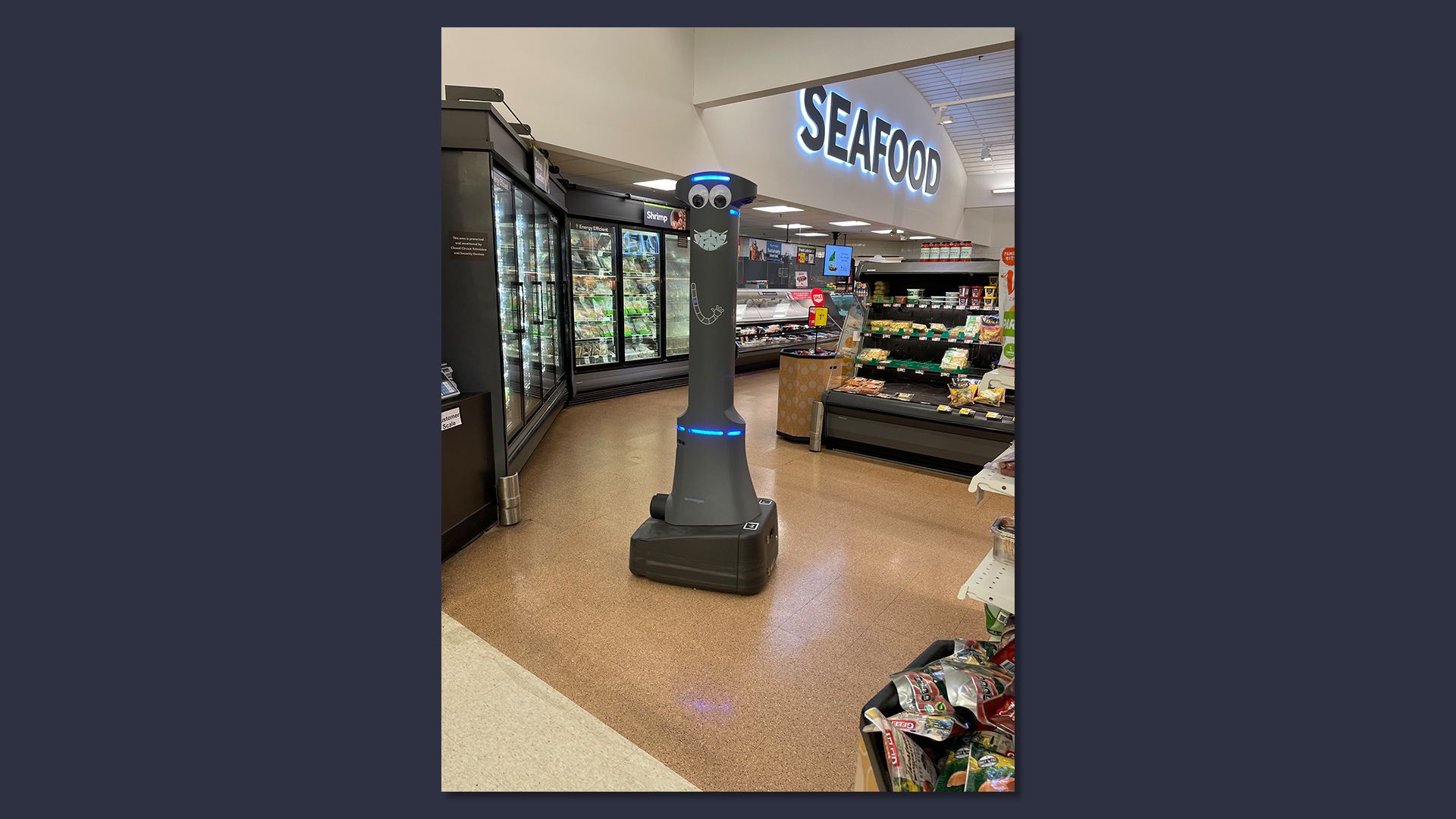| | | | | | | Presented By Walmart | | | | Axios What's Next | | By Jennifer A. Kingson, Joann Muller and Erica Pandey ·Aug 31, 2021 | | Happy Tuesday! We're kicking off the day with a look at how homeschooling has taken off under COVID-19 and a preview of the first all-civilian space mission. - Plus, Axios editors are doing a brief takeover of the Reader Photo competition. See what Jennifer A. Kingson came up with for a "What's Next?" photo, below.
- It's your turn. Send us a picture you took, and tell us what it says about What's Next in working, traveling, shopping, schooling, dining, etc., etc.: whatsnext@axios.com.
Today's Smart Brevity count: 1,294 words ... 5 minutes. | | | | | | 1 big thing: Homeschooling reaches critical mass |  | | | Illustration: Annelise Capossela/Axios | | | | The number of U.S. kids who are homeschooled has nearly doubled during the pandemic, Erica Pandey writes. Why it matters: Some parents have lost faith in traditional schools, others fear exposing their kids to the coronavirus — and the broad exodus could further weaken America's struggling public education system. By the numbers: Nearly 2.6 million kids have switched from traditional school to homeschooling since the pandemic began, according to a new report from the Bellwether Education Partners, commissioned by the Walton Family Foundation. - Now the total number of homeschooled kids sits at about 5 million. According to census data, more than 11% of U.S. households are now homeschooling.
- And it's not just white families who are moving to homeschooling: 9.7% of white families with kids have pulled out of traditional education, as have 12.1% of Hispanic families, 8.8% of Asian families and 16.1% of Black families.
Families' reasons for turning to homeschooling are varied. - For the first time in modern history, parents got a chance to observe their children's education up close, at home.
- Many are deciding they want more individualized learning options for their kids, whether that's more attention from educators or more personalized lesson plans, says Alex Spurrier, a senior analyst at Bellwether and one of the authors of the report.
Some families are fed up with virtual learning, while others don't feel safe sending kids to school while the pandemic still rages on. - Many families of color are choosing to homeschool their children because they're not satisfied with how schools are teaching kids about race and racism against the backdrop of social justice protests and rising Asian hate.
- "As an African American, I didn't like the way the school was addressing some of the cultural things going on," says Torlecia Bates, a mother of three in Richmond, Virginia, who switched to homeschooling during the pandemic. "Someone asked me when I'll return my kids to public school and I said, 'When I show up in the textbooks, and I'm represented well and accurately.'"
On top of the families who have pivoted to homeschooling, there are millions more who have moved their kids from public school to private school. - In fact, the total number of kids who have switched schools is a whopping 8.7 million, per the Bellwether report.
But, but, but: Working parents and lower-income families rarely have the resources to address the holes in their kids' education themselves. The bottom line: America's education system has long been slow to innovate, and the pandemic exposed its cracks, says Romy Drucker, the K-12 education director at the Walton Family Foundation. - "Parents want greater personalization, and this seems like a trend that's here to stay," she says. "Schools will have to earn back the trust of parents."
Share this story |     | | | | | | 2. A mission to space like no other |  | | | Illustration: Aïda Amer/Axios | | | | Editor's note: Axios space reporter Miriam Kramer and the How It Happened podcast team spent six months reporting How It Happened: The Next Astronauts, which starts today. The launch next month of the first all-civilian mission to orbit is an ambitious test for a burgeoning space industry's futuristic dream of sending many more ordinary people to space in the next few years, Miriam reports. Why it matters: Companies and nations envision millions of people living and working in space without having to become professional astronauts. Those hopes are riding on SpaceX's next mission, called Inspiration4. - Previous launches have taken billionaires to suborbital space or sent space tourists to the International Space Station alongside professional astronauts, but this mission is the first with a crew made up entirely of amateur astronauts.
What's happening: Inspiration4 is effectively a proof of concept for the idea that an all-civilian mission aboard SpaceX's Crew Dragon spacecraft — and ostensibly that all-amateur spaceflight — can work. - Four crewmembers — Jared Isaacman, Sian Proctor, Chris Sembroski and Hayley Arceneaux — will launch atop a Falcon 9 rocket from Cape Canaveral, Florida, on Sept. 15.
- They will orbit the Earth for about three days, flying higher than the International Space Station and Hubble Space Telescope before coming in for a splashdown off the Florida coast.
- During their mission, the crew will live in close quarters, stare down at Earth and at the stars, perform science experiments and keep an eye on how their spacecraft is performing while mission controllers monitor it from the ground.
How it works: Inspiration4's crew was chosen through means more akin to something on reality TV than professional astronaut selection. - Isaacman wanted the mission to be all-civilian from the start and he didn't want to just take a few of his friends along for the ride.
- Instead, he decided to add a fundraising component — raising $100 million for St. Jude Children's Research Hospital on top of Isaacman's $100 million donation — and open up seats to complete strangers.
- Sembroski was chosen via a sweepstakes that anyone could enter. Proctor won her seat through a contest for entrepreneurs. Arceneaux — a childhood cancer survivor treated by St. Jude who is now a physician assistant at the hospital — was picked by the charity to represent it in space.
Read the rest |     | | | | | | 3. Americans want more distance amid COVID |  Reproduced from Pew Research Center; Chart: Axios Visuals A Pew Research Center poll finds that Americans have become more likely to want to live in areas where "houses are larger and farther apart, but schools, stores and restaurants are several miles away," Ben Geman writes for Axios Generate. The intrigue: Correlation isn't causation. But the change between 2019 and this year occurred during the COVID pandemic and "the accompanying period of telework, remote schooling and pandemic-related restrictions on indoor dining and other indoor activities," Pew notes. Why it matters: It's another variable in the still-unfolding ways that the pandemic is affecting energy use. - Larger houses require more energy to heat and cool while living farther away from offices and services means longer drives.
- But the rise of telework can also deter some motor fuel consumption.
 Reproduced from Pew Research Center; Chart: Axios Visuals Share this story |     | | | | | | A message from Walmart | | Walmart adds tuition free education benefit for eligible associates | | |  | | | | Walmart announced it will pay 100% of college tuition and books for U.S. associates as part of its Live Better U program. Approximately 1.5 million part-time and full-time U.S. associates can now pursue college degrees and learn trade skills without the burden of education debt. More info. | | | | | | 4. The face of America's auto industry is changing |  Data: Bureau of Economic Analysis; Chart: Will Chase/Axios Foreign automakers now employ more U.S. workers than domestic carmakers do, according to fresh data from the U.S. Bureau of Economic Analysis, Joann Muller reports. Why it matters: The American auto industry is not the Detroit-based monolith it used to be. The shifting landscape now counts Chrysler as part of the Dutch giant Stellantis and Tesla as one of America's Big Three. - Meanwhile, global carmakers have been steadily expanding their U.S. manufacturing footprints.
By the numbers: About 51% of the 999,000 U.S. workers in the motor vehicles and parts manufacturing sector are employed by companies based in other countries, according to BEA data through 2019, the latest available. - That's up from 34% in 2009.
What they're saying: "This is all driven by investment," Nancy McLernon, president and CEO of the Global Business Alliance, tells Axios. "Global automakers are making big bets on U.S. manufacturing because we have a huge consumer market, a skilled workforce and a strong business climate." Details: Toyota, Mazda, Honda, Volkswagen, Volvo, BMW, Mercedes and Hyundai have all added jobs in the last few years, along with some of their suppliers. The bottom line: It's not just autos, McLernon says. - 69% of all new U.S. manufacturing jobs added in the past five years were created by global companies.
Read the rest. |     | | | | | | 5. Photo of the day |  | | | Photo: Jennifer A. Kingson | | | | What's Next: Automated supermarket floor cleaners/security thingies Axios' Jennifer A. Kingson writes: "I saw this wandering floor cleaner/security robot in a Stop & Shop in East Northport, N.Y. (on Long Island). "A suburban friend tells me that I am a woeful city slicker, and that these thingamajigs are common in suburban supermarketry. That is probably true! I live in Manhattan, where the grocery stores are barely large enough to wheel a wee shopping cart, let alone give space to a human-sized anthropomorphic vacuum." |     | | | | | | A message from Walmart | | Largest U.S. private employer commits nearly $1B in career training | | |  | | | | Walmart will now pay 100% of college tuition and books for associates through its Live Better U education program. Key numbers: | | | | Thanks for reading! Please send photos, comments and hot sauce recipes to whatsnext@axios.com. And tell your friends to sign up for What's Next! Subscribe here. |  | | It'll help you deliver employee communications more effectively. | | | | | | Axios thanks our partners for supporting our newsletters. If you're interested in advertising, learn more here.
Sponsorship has no influence on editorial content. Axios, 3100 Clarendon Blvd, Suite 1300, Arlington VA 22201 | | | You received this email because you signed up for newsletters from Axios.
Change your preferences or unsubscribe here. | | | Was this email forwarded to you?
Sign up now to get Axios in your inbox. | | | | Follow Axios on social media:    | | | | | |










No comments:
Post a Comment